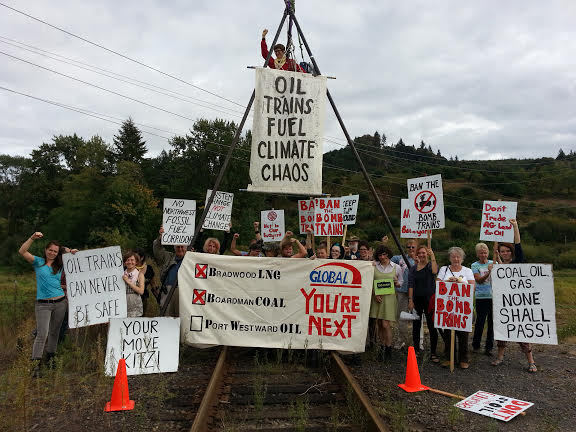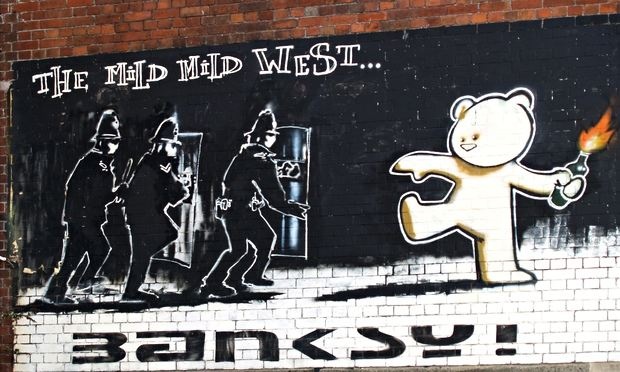
December 6th, 2014
by Steven Morris / The Guardian
It is the city of the subversive street artist Banksy, a centre for alternative lifestyles and underground politics. Even the directly elected independent mayor, George Ferguson, praises the anarchic spirit of Bristol.
But over the last four years the city and its environs have been targeted by radicals who have not been satisfied with non-violent expression and protest.
The police have revealed for the first time that they are linking more than 100 acts of vandalism against police stations, politicians, military bases, banks, multinational companies, car dealerships, railway lines, magistrates courts and churches believed to have been carried out by anarchists. They have put a £10,000 reward on the head of one suspected offender, a 27-year-old activist called Huw “Badger” Norfolk.
A permanent team of 10 detectives, working under the codename Operation Rhone, has been set up to try to trace the perpetrators and police have warned that it can only be a matter of time before somebody is seriously hurt or killed in one of the attacks. “I’m really surprised that nobody has been injured so far,” said DCI Andy Bevan, who is leading the search.
But Bristol’s long-established anarchist community is not taking the police operation lying down. The minorityresponsible for the violence has vowed to continue the attacks. Many of the vast majority not involved have hit back at what they see as attempts by the police to prop up the establishment, suppress radicalism and split the community. They are organising demonstrations against the police.
“The feeling is that they are using these attacks as an excuse for targeting anyone with alternative ideas. It’s not going to work,” said one anarchist, who asked not to be named. “It is a strong, solid community. That’s why the police can’t find the people they are after.”
Avon and Somerset police took the unusual step this week of naming Norfolk in connection with two incidents. One was a vandalism attack on the offices of the Bristol Post in August 2011 at the time of protests around Britain following the shooting of Mark Duggan in north London. Windows were smashed and paint splashed over the front of the building. The other was an arson attack on a phone mast in January 2013 that cut off television, radio and mobile phone signals to thousands of homes and businesses.
Norfolk is a well-known and largely popular figure within the UK anarchy scene. He was born in the leafy Bristol suburb of Westbury-on-Trym to David Norfolk and Gill Garrett.
The Cambridge-educated David Norfolk, 65, runs a consultancy advising the nuclear industry. Garrett, 64, is a retired lecturer and author of medical textbooks and a well-known local poet. Earlier this year she wrote a poem about waiting for her son’s birth and worrying that an early spring would precipitate his arrival: “Delay your debut until spring has truly come.”
Their daughter, who is two years older than Badger, followed a conventional career route, attending university and found finding work in health and social care.
In contrast, after leaving school Huw Norfolk moved from squat to squat, mainly in Bristol, but at one point was living in the nearby Forest of Dean. For a while he helped run anarchist book fairs in Bristol and helped out at a community kitchen. “He’s a gentle, lovely guy but committed to the cause,” said one friend.
At the time of the attack on the Bristol Post he was believed to be living in a squat on Park Row in the centre of Bristol but when police raided the premises looking for him he had gone. While on the run, he posted a defiant open letter on the anarchist website 325.nostate spelling out his world view and extolling the virtues of “proud lives of rebellion and compassion, reclamation and antagonism, poetry and fire”.
He said: “I am one of those who simply cannot and will not stomach the social, economic, moral, psychological, physical conditions not of our making that we are born into at this point of history. I have never sought to decorate the walls of my cell with exam certificates, job promotions, sports prizes, status symbols borrowed from the wealthy by our labour.
“I curse those who sell themselves so cheaply to buy such unimaginative dreams at the expense of a possibility of a freedom truly of their own making. Since an early age this unwillingness and refusal has put me in conflict, like countless others, with that reality. And our understanding is growing along with our fury.”
He signed off the 800-word letter: “Action replaces tears. For solidarity and self-organisation, Huw ‘Badger’ Norfolk – just another fugitive.”
Since then police have found no trace of Norfolk. They have linked him to the attack on the communications mast in January last year but now believe he may be lying low somewhere else in Britain – or could be abroad.
They have published details of his appearance, including distinctive tattoos, but said he was known to change his appearance and use other names.
Although the police have only identified the two incidents they want to speak to Norfolk about, there are many more that the police have not linked to him. By far the most spectacular was an arson attack on a new police firearms centre close to the Avon and Somerset’s force headquarters in August 2013, which caused £16m of damage.
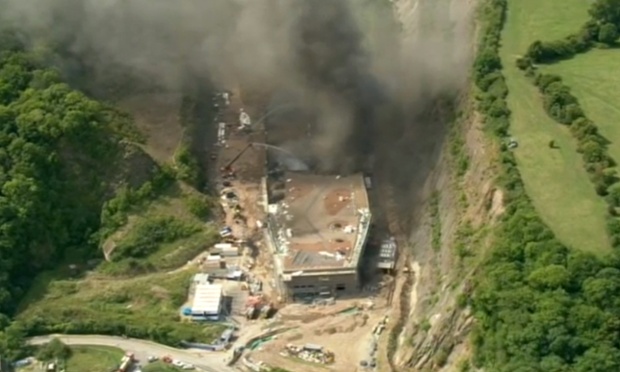
The spectacular arson attack on a new police firearms centre in 2013
caused £16m of damage. Photograph: BBC
A group calling itself Angry Foxes Cell claimed on 325.nostate that it had carried out the attack. “We left it with flames licking high … It put smiles on our faces to realise how easy it was to enter their gun club and leave a fuck you signature right in the belly of the beast, with a curious fox as our only witness.”
The post claimed the attack was “also our way of marking two years that Bristol anarchist Badger has evaded capture” and added: “Stay free, keep fighting!”
There is no sign of the attacks stopping. Just before the Nato summit took place in Newport, south Wales, in September this year a group calling itself “Random Anarchists” set fire to an Air Cadet minibus in Bristol to highlight “the ways in which militarisation works its way into the fabric of daily life”.
The latest took place at the end of last month when five cars were torched in Long Ashton on the edge of the city. Four of the cars were parked on driveways and police said they could easily have put sleeping householders at risk.
On the 325.nostate site the attack was claimed by “FAI Torches in the Night/Earth Liberation Front”. It said two of the cars had been linked to a multinational power company and a provider of security equipment; the other three were high-end cars targeted to highlight the “green washing” charade of Bristol’s status as European green capital next year.
The police have stepped up their search for the attackers in recent months, angering many within Bristol’s non-violent alternative community. One activist, Al, an office worker in his 20s, who said his house was raided by an “army” of Operation Rhone officers, dismissed the police justification that they were trying to prevent anyone dying.
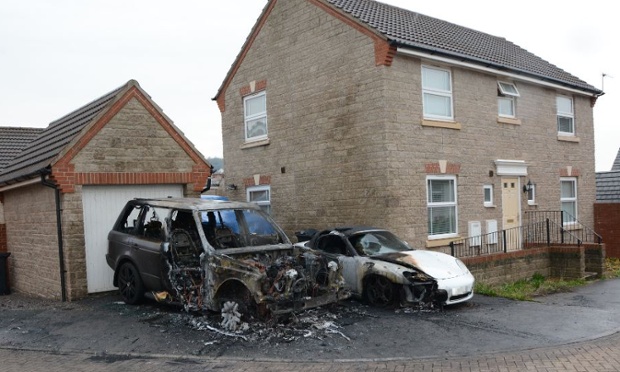
Arson attacks in Long Ashton last month destroyed five cars.
Photo from The Guardian
He argued that nobody had been hurt in the attacks – while people were dying in police custody all the time. “If the police want to prevent deaths, they should leave us alone and start arresting each other,” he told the Guardian.
Al said: “I think that the police’s actions are an attempt to make it look like they’re doing something. They care more about their image in the press than about the welfare of ordinary people. Their choice of who to target is also political and feels like harassment policing – making it clear that they know where we live and work, and that they can come into our homes and take what they want, whenever they like.
“This hasn’t worked – I knew already that police are here to keep the rich in power and keep us down. Since the raid, I also know that people in my community will stand by me and support me, whatever the police try to do. I hope that they stop harassing people, but if they do not then they should know that it will only make us more united, and more angry.”
Last month a group of about 20 anarchists turned up at the headquarters of Avon and Somerset police’s CID and special operations unit and made a nuisance of themselves as officers arrived for work.
A letter was published on websites including that of the Bristol Anarchist Federation and Bristol Defendant Solidarity, signed by more than a dozen groups accusing the police of resorting to “desperate” tactics to try to hunt down those behind the attacks.
It claimed the police had launched a “concerted effort to intimidate and divide us all,” adding: “A big part of their plan is to scare people into inaction and to create divisions between us. They hope to get us blaming each other for increased surveillance to the point where someone falls for their lies and starts talking to the bad guys.”
Bevan said he believed only a small group of anarchists was behind the attacks, arguing that if the group was a big one, someone would have broken ranks. He said the attacks were well planned and skilfully executed, suggesting the perpetrators were organised and intelligent.
He was keen to emphasise that the financial impact was just one element, claiming that as well as putting human lives at risk, some of the incidents had caused environmental damage.
Bevan insisted that the force was not trying to clamp down on Bristol’s counter-culture or harassing people with alternative lifestyles. “That’s a fantastic part of the city. Avon and Somerset police supports peaceful protest. These attacks are something quite different.”

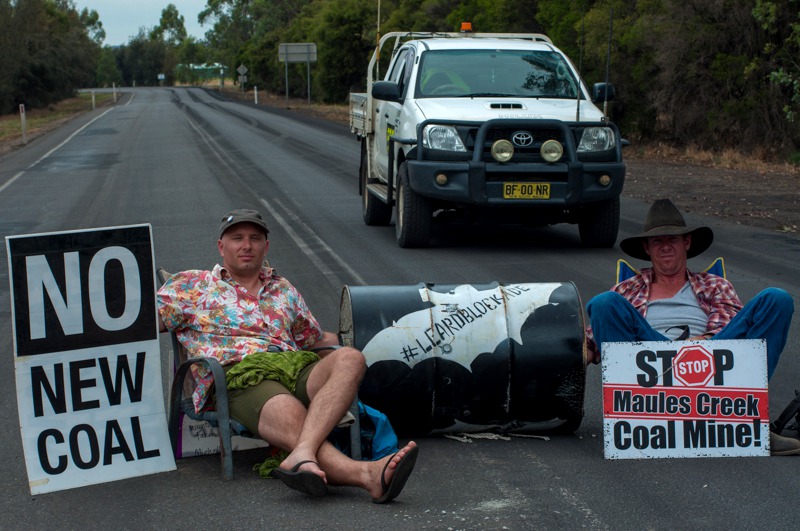
GUNNEDAH, 4 December 2014: Sustained protest against Whitehaven Coal’s controversial Maules Creek mine in the Leard State Forest continues this morning, as two men chained themselves to a concrete barrel at Whitehaven Coal’s Gunnedah coal handling and preparation plant. 31 year old Maules Creek farm-hand Adam Ryan and 37 year old, Sydney based father and corporate lawyer, Matthew Drake-Brockman have taken action to protest against what Drake-Brockman describes as the ‘lax approval processes’ that allowed the scandal-plagued mine to go ahead.
Mr Ryan, born in nearby Wee Waa, cited concerns about mining impacts on water and the subsequent effect on the local agricultural industry, saying “this mine is destroying the community that I have known my whole life. The time for standing by has passed, we have to stand up for our community.”
Mr Drake-Brockman was involved in a 2007 lawsuit against the then Planning Minister regarding planning approval processes, with the case focussing on the fact that the approval did not take into account the impacts of climate change.
Mr Drake-Brockman said, “The whole process between what goes on in parliament and what goes on in industry is not transparent – there is no way the public can know what’s going on. There is not a great deal of room for input from the public in this system – if there was we would already be moving away from coal and into renewable energy.”
Drake-Brockman continued, “It has become necessary that we all stand up and become citizen activists against the corrupt state government and Whitehaven Coal and to stand in solidarity with farmer’s, whose livelihood and health are under threat, and will only get worse with climate change.”
In the last week there have been 10 arrests including high profile former Wallabies captain, David Pocock, prominent local farmer, Rick Laird and IPCC contributing author, Prof. Colin Butler. The long running protest camp has seen thousands flock to protest the mine and over 290 arrests take place.
Leard Forest Alliance spokesperson, Phil Evans said, “Hundreds of Australians including doctors, professors, World War II veterans, sports players and young people have stood alongside local farmers and risked arrest to say that the Maules Creek project is wrong and should not go ahead. Surely, this sends a signal that something is broken with the way we decide on whether coal mines go ahead.”
“We need an immediate stop to work whilst there is a long, hard look at the planning approval process – so that ordinary Australians can have faith in their government’s independence from big coal and the big end of town.”
Whitehaven Coal’s share-price fell to new lows this week dipping to $1.07 on Tuesday.
UPDATE 12:30pm: Police have arrived on site.
UPDATE 4:30pm: Both men have been arrested and taken to Gunnedah police station to be charged.
Further Information:
Phil Evans
Leard Forest Alliance Spokesperson
0490 064 139
Pictures and footage for media use: https://www.mediafire.com/#ir1c4tq4oncu2
Twitter updates @FLACCoal and #LeardBlockade
from Front Line Action on Coal


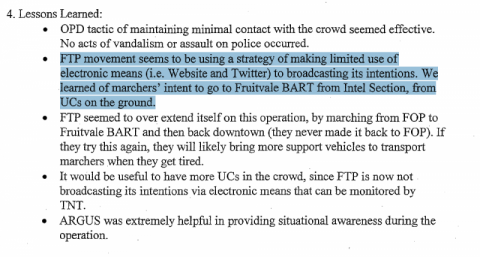



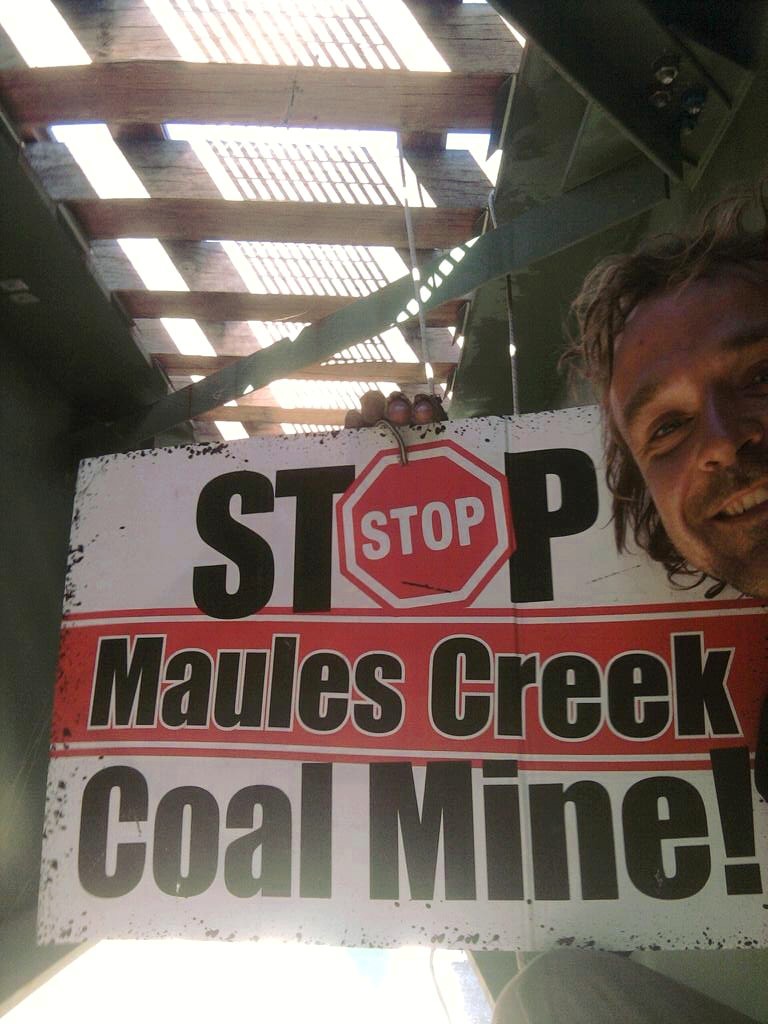
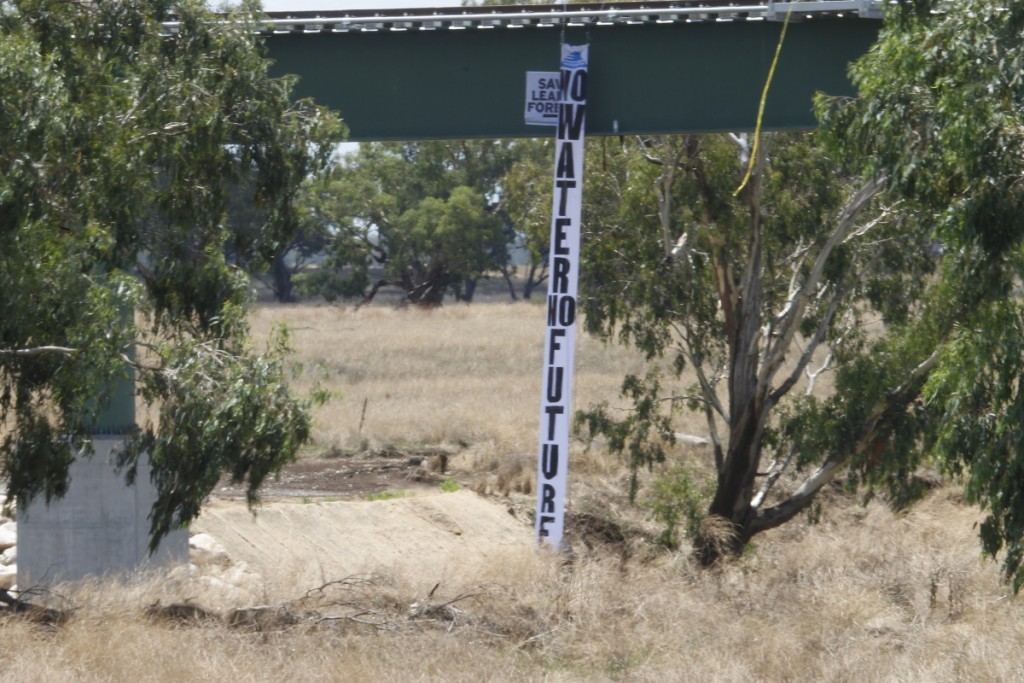
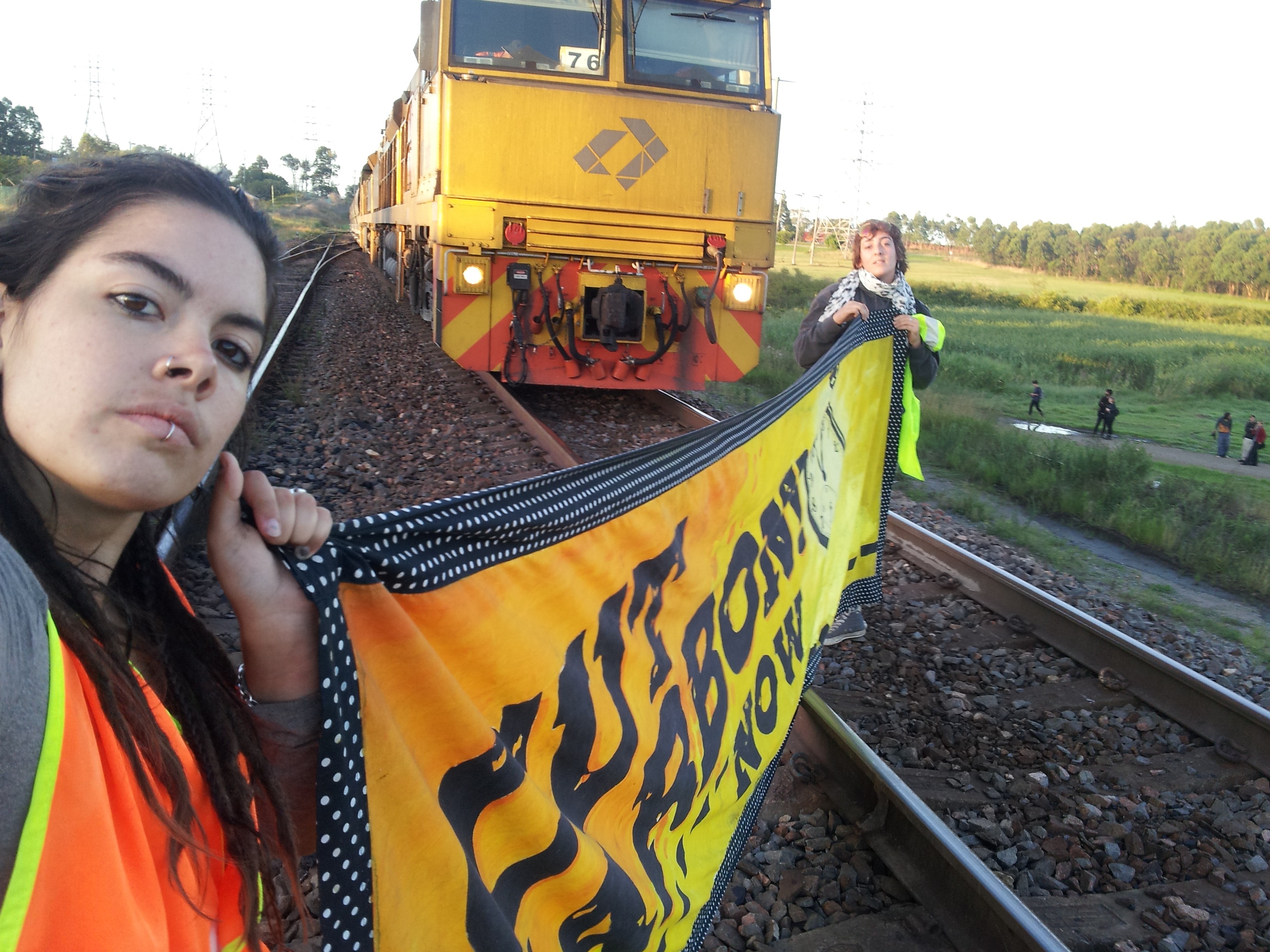
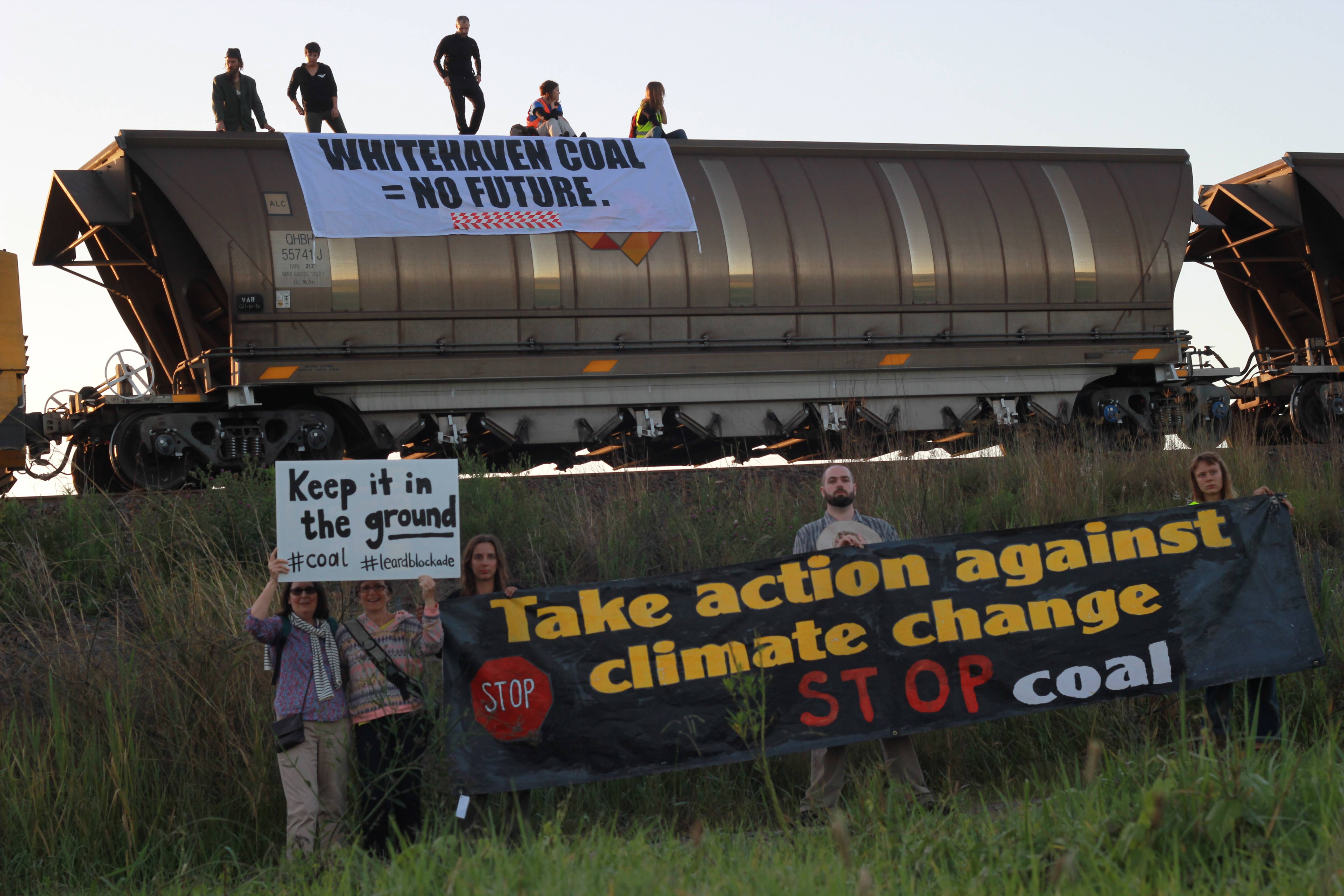
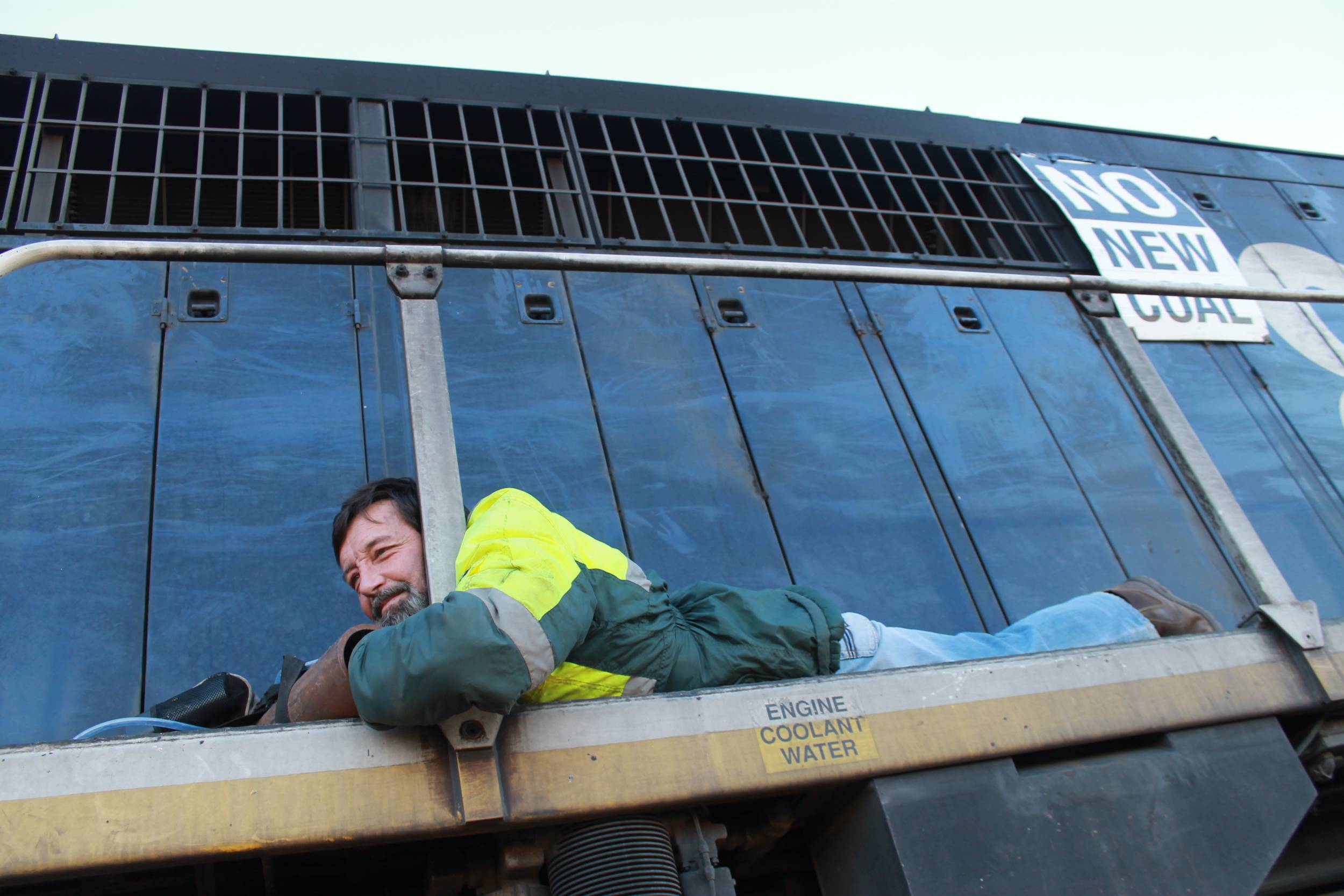

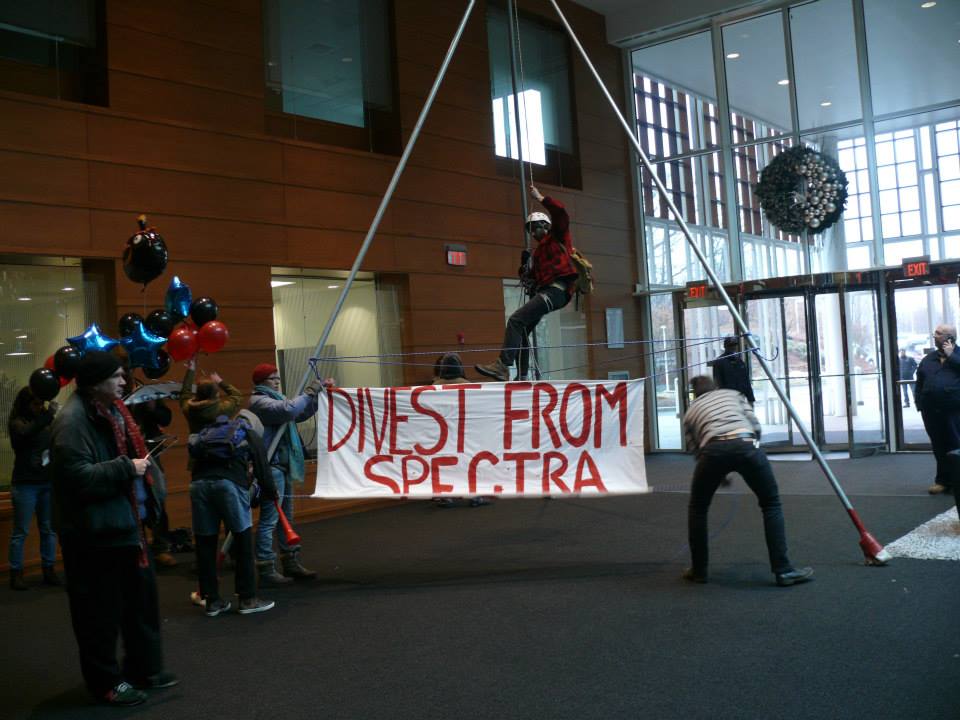








 3/12/14
3/12/14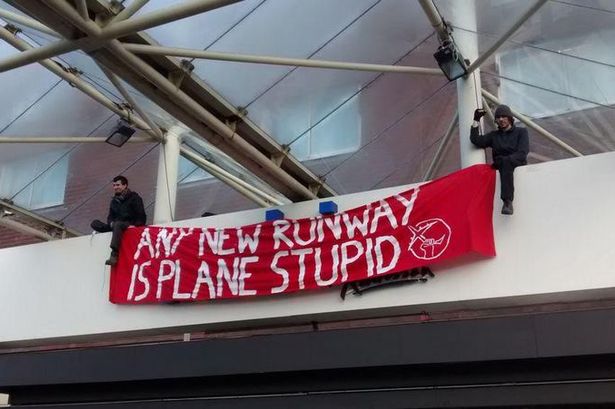 3/12/14
3/12/14

